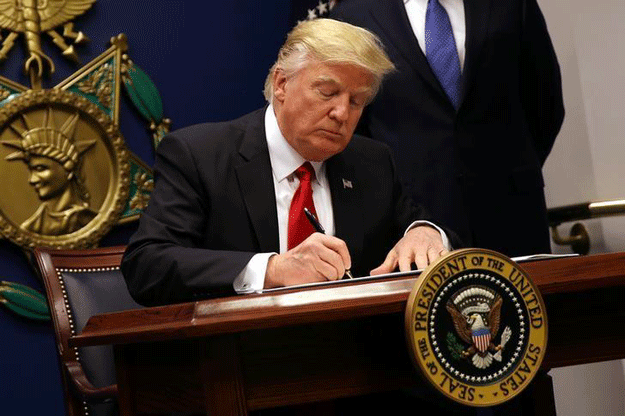
US President Donald Trump has announced sweeping new tariffs on goods imported from Canada, Mexico, and China, escalating trade tensions with the country’s three largest trading partners.
The tariffs, set to take effect on Tuesday, include a 25% duty on imports from Canada and Mexico and a 10% tariff on Chinese goods. Canadian energy products will face a lower 10% levy.
Trump justified the move as a response to illegal immigration and drug trafficking concerns, invoking the International Emergency Economic Powers Act (IEEPA).
“Today’s tariff announcement is necessary to hold China, Mexico, and Canada accountable for their promises to halt the flood of poisonous drugs into the United States,” the White House said in a statement posted on X.
Canada and Mexico swiftly condemned the tariffs, announcing plans for retaliatory measures.
Canadian Prime Minister Justin Trudeau said Ottawa would impose 25% tariffs on $155 billion worth of US goods, including beer, wine, fruit, vegetables, clothing, and household appliances.
“We don’t want to be here, we didn’t ask for this,” Trudeau said at a press conference. “But we will not back down in standing up for Canadians.”
Mexico’s President Claudia Sheinbaum called the US accusations of links between her government and drug cartels “slander.” Mexico is preparing retaliatory tariffs of 25% on American imports, targeting key industries.
Beijing also expressed strong opposition to the tariffs, calling them “wrongful practices.” The Chinese government stated it would file a complaint with the World Trade Organization and take “all necessary steps” to safeguard its economic interests.
China’s vice-premier Ding Xuexiang had previously advocated for a “win-win” trade relationship, but the new tariffs risk further straining diplomatic ties.
Economists warn the tariffs could lead to higher prices on goods ranging from cars and steel to fresh produce and alcohol. The auto industry, in particular, could be severely impacted, with TD Economics estimating an increase of $3,000 in the average US car price.
A report by the Peterson Institute for International Economics suggested that broad 25% tariffs on Canada and Mexico could slow economic growth and drive up inflation in all three countries.
US industry groups also raised concerns. The National Homebuilders Association warned of rising housing costs, while the Farmers for Free Trade group said tariffs would worsen challenges faced by American farmers.
Trump acknowledged that the tariffs could cause “some temporary, short-term disruption” but insisted they were necessary to protect US interests.
Despite the tensions, trade experts believe Trump could roll back the tariffs if Canada and Mexico agree to additional border security measures.
Ashley Davis, a Republican lobbyist, said Trump may use the tariffs to extract concessions. “The border and China were the two biggest issues in November’s elections,” she said. “Anything he can do to claim wins on that, he’s going to do.”
For now, trade relations among North America’s largest economies remain on edge, with businesses and consumers bracing for the impact of escalating tariffs.


























COMMENTS
Comments are moderated and generally will be posted if they are on-topic and not abusive.
For more information, please see our Comments FAQ